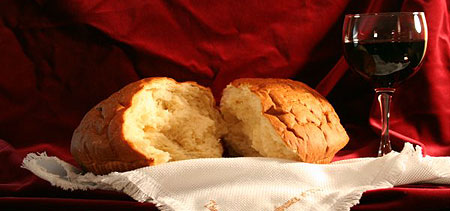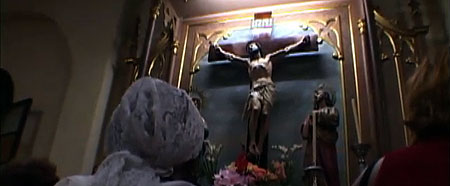
Today we were reading Luke 22 where Jesus is having the Passover meal with his closest friends, just before he will be killed. He knows it, and he’s told them… but I’m pretty sure they still don’t get it.
It’s cool enough how they got into this room (Jesus sent two guys ahead, told them exactly what they would find without having been there, and they did) but there are also a couple cool lines that stood out to me today.
When the time came for Jesus and the apostles to eat, he said to them, “I have very much wanted to eat this Passover meal with you before I suffer.”
I thought it was so cool to read the excitement in Jesus’ words. Even though he knew what was coming, he was still excited about what the suffering would bring. The end result. Very cool. Ephesians says it was his plan from before he created anything, and that it “gave him great pleasure”. Very cool.
As the evening went along, we read the following accounts of the events that took place:
Jesus took a cup of wine in his hands and gave thanks to God. Then he told the apostles, “Take this wine and share it with each other. I tell you that I will not drink any more wine until God’s kingdom comes.”
Jesus took some bread in his hands and gave thanks for it. He broke the bread and handed it to his apostles. Then he said, “This is my body, which is given for you. Eat this as a way of remembering me!
After the meal he took another cup of wine in his hands. Then he said, “This is my blood. It is poured out for you, and with it God makes his new agreement.
First of all, don’t you think they thought it was weird that he said “remembering me”? We know now what happened next, but they didn’t. It is obvious from everything they do. So he’s already talking about being gone, and they’re probably very confused.
Did you also notice there were two cups of wine? Jesus took one cup and told them to share it. Then he shared the bread with them. Then he took another cup of wine after they had finished eating and said this is my blood. The new agreement God makes with you. Again, they were probably a bit weirded out, but I just thought it was interesting that it wasn’t that much like what we observe today, supposedly “instituted” by Jesus himself on that very night.
I don’t pretend to have a clue what “the Lord’s Supper” really is, or any significance of it at all. I really have no idea what Jesus intended for it, if anything. He didn’t seem to be a big ritual guy. And really, when I read this… he wasn’t here either. They were observing the Passover feast – something Isreal had done for a VERY long time – and those were parts of that. He didn’t say, “And make sure you do this exact same thing from now until forever!” I actually don’t hear him saying to ever repeat it again. Just… for that moment. Interesting.
NOTE: I don’t really want a big theological debate. Just some observations from reading the Bible today. Your comments are welcome, but please know that I won’t be engaged in any endless hermeneutical discussions of Scripture and the historical and cultural significance. I’ll certainly read/entertain shorter versions… but doctrinal discussions are definitely not my cup of tea… 🙂



 Inspired by recent readings, hearings and various thinkings floating through GregsHead, I have thought again about our push for being right. For knowing the truth and letting others “have it”. I read
Inspired by recent readings, hearings and various thinkings floating through GregsHead, I have thought again about our push for being right. For knowing the truth and letting others “have it”. I read